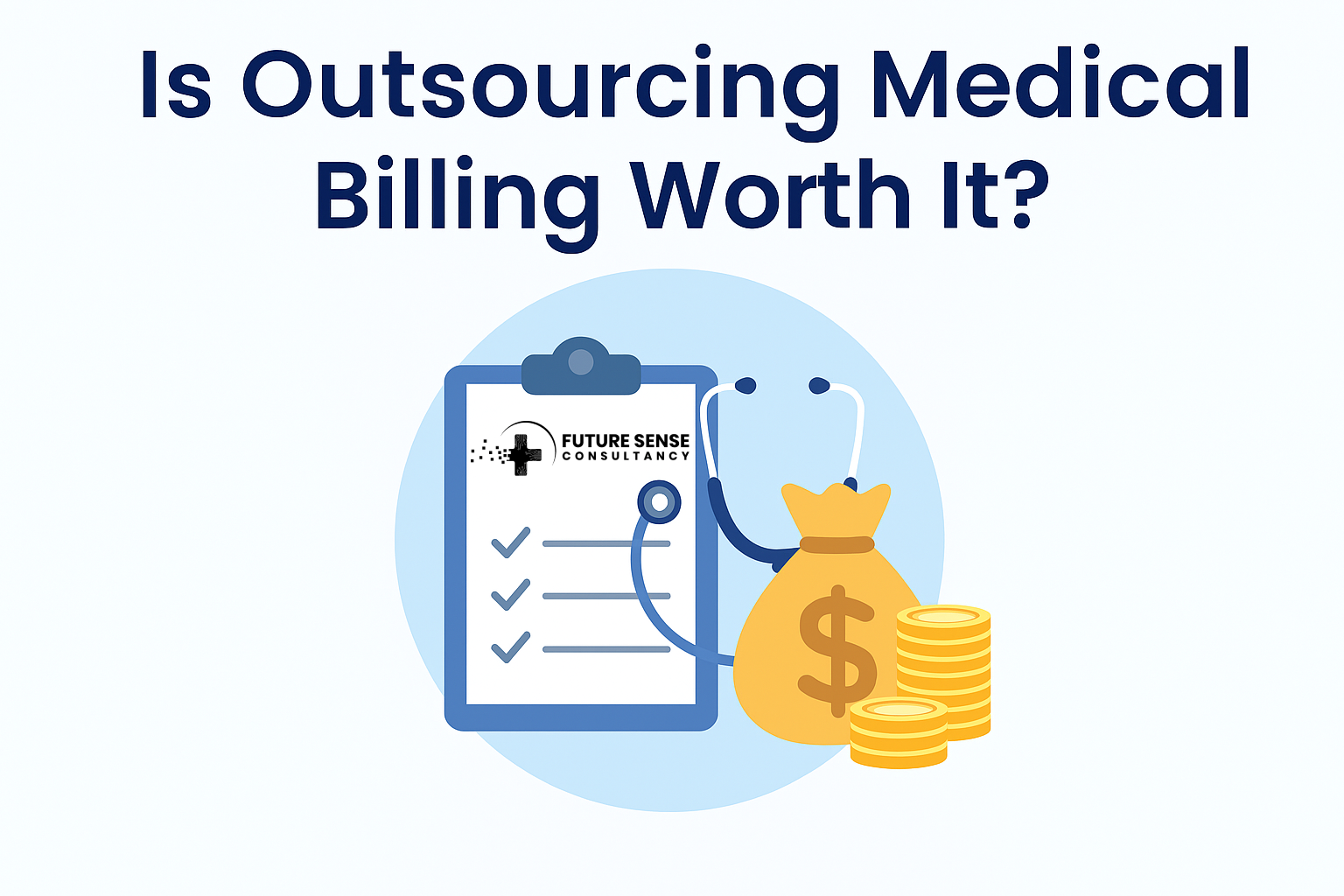Is Outsourcing Medical Billing Worth It? 2025 Cost-Benefit Analysis for Practices

Is Outsourcing Medical Billing Worth It? 2025 Cost-Benefit Analysis for Practices
If you're wrestling with mounting billing challenges, delayed payments, or an overwhelmed staff, you've probably asked yourself: Is outsourcing medical billing worth it? The short answer is yes for most practices. But the real question isn't just whether it's worth it, but whether it's the right move for your specific situation.
Medical billing has evolved into a complex, time-consuming operation that requires specialized expertise, constant education, and significant resources. As a healthcare provider, your primary focus should be on delivering excellent patient care, not navigating insurance company portals or chasing down unpaid claims. Yet many practices find themselves trapped in billing struggles that drain profitability and staff morale.
In this comprehensive analysis, we'll examine the true costs, measurable benefits, and critical factors you need to consider to determine whether outsourcing medical billing makes financial and operational sense for your practice.
Understanding the Real Cost of Medical Billing
What Does In-House Medical Billing Actually Cost?
Before determining if outsourcing medical billing is worth it, you need to understand what you're currently spending. Most practice owners significantly underestimate their true billing costs because they only calculate the obvious expenses.
A full-time medical biller typically earns between $35,000 and $55,000 annually, depending on experience and location. However, that's just the starting point. Add employee benefits health insurance, retirement contributions, paid time off, and payroll taxes and your actual cost increases by 25-35%. That $45,000 salary suddenly becomes $56,000-$60,000 in total compensation.
But the expenses don't stop there. You'll need billing software licenses ($3,000-$15,000 annually), hardware and computers, office space (calculate square footage cost), continuing education and training, clearinghouse fees for claim submission, and management time overseeing the billing operation. When practices conduct honest assessments, they often discover their true billing costs exceed $70,000-$100,000 annually for even modest operations.
Then there are the hidden costs that rarely appear in budget calculations. Staff turnover requires recruitment expenses, training time, and productivity losses during the learning curve. Medical billing knowledge takes 6-12 months to fully develop, meaning new hires operate at reduced efficiency during this period. When billers take vacation or sick leave, claims pile up, causing revenue disruptions. These indirect costs can add another 15-20% to your total billing expense.
The Investment Required for Outsourced Medical Billing
Outsourced medical billing typically operates on a percentage-of-collections model, usually ranging from 4-10% depending on practice size, specialty complexity, and services included. Some companies offer flat-fee arrangements or per-claim pricing, but percentage-based models align the billing company's incentives with your revenue goals they only make money when you get paid.
For a practice collecting $1 million annually, a 6% arrangement would cost $60,000 per year. This fee typically includes claim submission, payment posting, denial management, patient billing, and reporting. Many companies also include credentialing services, provider enrollment, and compliance support at no additional charge.
The initial setup process may involve one-time implementation fees ($1,000-$5,000) covering system integration, workflow setup, and staff training. While this represents an upfront investment, it's typically offset by improved collections within the first few months.
Measuring the Financial Return: Is Outsourcing Medical Billing Worth It?

Increased Revenue and Collection Rates
The most compelling financial argument for outsourcing centers on improved collections. Professional billing companies consistently achieve collection rates of 95-98% compared to the 85-92% that many in-house operations manage. This difference might seem small, but the financial impact is substantial.
Consider a practice with $1.2 million in annual charges. At an 88% in-house collection rate, you're collecting $1,056,000. A professional billing company achieving a 96% collection rate on the same charges would collect $1,152,000 an additional $96,000 in revenue. Even after paying a 6% outsourcing fee ($69,120), you're netting an extra $26,880 while eliminating in-house billing overhead.
These improved results stem from several factors. Professional billers submit claims faster typically within 24-48 hours of service instead of the weekly or bi-weekly batches common with busy in-house staff. They follow up on unpaid claims more aggressively and consistently. Their expertise in coding and payer requirements reduces denial rates from the typical 15-20% down to 5-8%. They have established relationships with insurance company representatives, expediting problem resolution.
Cost Savings and Operational Efficiency
Beyond improved collections, outsourcing delivers measurable cost reductions. You eliminate salaries, benefits, payroll taxes, and workers' compensation insurance for billing staff. Software licensing fees disappear or decrease significantly since the billing company provides the technology. Office space currently dedicated to billing can be repurposed for clinical use, potentially allowing you to see additional patients.
Management time represents another significant savings that's often overlooked. Practice administrators and physicians spend countless hours hiring billers, managing performance, staying current with regulations, and solving billing problems. This time has real economic value hours you could spend on practice development, patient care, or simply achieving better work-life balance.
The efficiency gains extend beyond direct costs. Professional billing companies leverage economies of scale, using advanced automation tools that would be cost-prohibitive for individual practices. They maintain redundant staffing so vacations, illnesses, or turnover never disrupt your revenue cycle. They invest in ongoing education that keeps billers current with constantly changing codes and payer policies.
Beyond the Numbers: Operational Benefits of Outsourcing Medical Billing
Business Continuity and Risk Reduction
One of the most valuable yet hardest-to-quantify benefits of outsourcing is the elimination of key-person risk. When your sole medical biller or small billing team holds critical knowledge about your revenue cycle, their absence creates immediate problems. Vacations cause backlogs. Sick days disrupt cash flow. When they resign, you face potential catastrophe interviewing replacements while claims pile up and revenue plummets.
Outsourcing eliminates this vulnerability completely. Professional billing companies maintain depth in staffing, with multiple billers familiar with your account and backup systems ensuring uninterrupted service. If your primary account manager leaves the company, transition happens seamlessly with no impact on your revenue. This business continuity alone makes outsourcing worth it for many practices.
Access to Specialized Expertise
Medical billing has become remarkably complex. Insurance companies change policies quarterly. New CPT and ICD codes roll out annually. Payer-specific requirements vary widely. Medicare regulations evolve constantly. Electronic health record systems require integration expertise. Staying current with all these changes while handling daily billing workload overwhelms most in-house staff.
Professional billing companies invest heavily in expertise development. Their billers typically hold professional certifications like Certified Professional Coder (CPC) or Certified Professional Biller (CPB). They participate in ongoing education programs. They specialize by medical specialty, meaning your dermatology practice works with billers who understand dermatology coding and payer requirements intimately.
This specialized knowledge translates directly to better financial outcomes. Expert billers capture appropriate evaluation and management levels, maximize reimbursement for procedures, navigate modifier requirements correctly, and understand payer-specific documentation needs. They know which battles with insurance companies are worth fighting and how to win them.
Scalability for Practice Growth
As your practice grows, billing complexity increases exponentially. Adding providers means more claims, different specialties may introduce new coding challenges, multiple locations create additional complications, and hiring additional billing staff becomes necessary but at what point?
Outsourcing provides seamless scalability. When you add a provider, your billing company simply adjusts capacity without you hiring, training, or managing additional staff. When you open a second location, they implement the necessary workflows without doubling your billing department. If you acquire another practice, they absorb the additional volume smoothly.
This scalability works in reverse too. If a provider retires or you temporarily reduce clinical hours, your outsourcing costs decrease proportionally (in percentage-based models). With in-house staff, you maintain fixed salary expenses regardless of volume fluctuations.
When Outsourcing Medical Billing May Not Be Worth It
While outsourcing benefits most practices, certain situations favor keeping billing in-house. Large practices and hospital systems with high volumes may achieve economies of scale that make in-house operations competitive with outsourcing costs. If you're processing 10,000+ claims monthly with dedicated management infrastructure, the per-claim cost of internal billing can approach outsourced rates.
Practices with unique billing situations or highly specialized niches sometimes struggle to find outsourcing partners with relevant expertise. If you're doing cutting-edge procedures with complex coding scenarios, you may need to develop internal expertise rather than relying on external partners.
Control-focused physicians who want direct oversight of every billing decision may find outsourcing psychologically challenging, even when financially beneficial. If you view billing as a core competency and competitive advantage rather than an administrative necessity, maintaining internal operations might align better with your practice philosophy.
Finally, if you currently have a high-performing billing team achieving 95%+ collection rates with low overhead, outsourcing may offer limited additional benefit. The decision to outsource should improve your situation measurably if your current operations are already excellent, change for its own sake makes little sense.
Critical Questions to Determine If Outsourcing Medical Billing Is Worth It for Your Practice

Evaluate Your Current Performance
Start by honestly assessing your current billing performance. What's your actual collection rate the percentage of allowable charges you're collecting? How many days is your average accounts receivable outstanding? What percentage of claims are denied on first submission? If you don't know these metrics, that's a red flag indicating insufficient visibility into your revenue cycle.
Calculate your current all-in costs for billing, including all direct and indirect expenses. Then obtain quotes from 3-4 reputable billing companies and compare both costs and expected performance improvements. The financial case becomes clear when you run these numbers honestly.
Consider Your Practice's Strategic Direction
Think about where you want your practice in 3-5 years. Are you planning growth, looking toward retirement, or maintaining current size? Growth-focused practices almost always benefit from outsourcing's scalability. Practices planning for sale or succession find outsourcing makes the business more attractive to buyers by removing key-person dependencies.
Ask yourself what you want to focus your energy on. If you're passionate about building billing excellence and view it as strategic advantage, invest in internal capabilities. If billing feels like a distraction from patient care and practice development, outsourcing liberates you to focus on your priorities.
Assess Your Risk Tolerance
How comfortable are you with billing disruptions? If your sole biller resigns next month, do you have a continuity plan? Can your practice absorb a 2-3 month revenue dip during transition? If these scenarios create anxiety, outsourcing's risk mitigation may be worth it regardless of direct cost comparisons.
How to Choose the Right Medical Billing Partner
If you've determined that outsourcing medical billing is worth it for your practice, selecting the right partner becomes critical. Not all billing companies deliver equal results, and choosing poorly can create more problems than you started with.
Look for companies with specific experience in your medical specialty. A billing company expert in primary care may struggle with orthopedic surgery's different procedures, modifiers, and payer requirements. Request references from practices similar to yours and actually contact them.
Evaluate their technology capabilities and reporting transparency. You should expect real-time access to key performance metrics through an online dashboard, not monthly PDF reports. Ask to see a demo of their reporting system during the evaluation process.
Understand their fee structure completely. What exactly is included in their percentage rate? Are there additional charges for patient statements, denial appeals, or credentialing? How do they handle refunds or patient credits? Get everything in writing before signing.
Review contract terms carefully. Avoid companies requiring multi-year commitments with punitive termination clauses. The best billing companies earn your continued business through performance, not contractual locks. Look for agreements with 90-day termination provisions after an initial period.
Making the Transition to Outsourced Medical Billing
Once you've selected a partner, plan for a 60-90 day transition period. The billing company will integrate with your practice management system, establish workflows, and begin processing new claims while potentially working through any existing backlogs.
Expect some initial adjustment as both parties learn to work together effectively. Maintain open communication, address issues promptly, and give the relationship time to mature before judging results. Most practices see improved cash flow within 60-90 days and full performance optimization within 4-6 months.
Conclusion: Is Outsourcing Medical Billing Worth It?
For the vast majority of small to mid-sized medical practices, outsourcing medical billing is absolutely worth it. The combination of improved collections, reduced overhead costs, eliminated personnel risks, and access to specialized expertise delivers compelling financial returns while allowing you to focus on patient care rather than administrative headaches.
The practices that benefit most from outsourcing typically share several characteristics: they're experiencing billing challenges or staff turnover, they're focused on growth, they lack specialized billing expertise internally, and they view billing as a necessary function rather than a core competency.
However, outsourcing isn't a magic solution that automatically fixes all problems. Success requires choosing the right partner, maintaining appropriate oversight, and working collaboratively to optimize your revenue cycle. The billing company should feel like an extension of your team, invested in your success and responsive to your needs.
Ready to explore whether outsourcing medical billing is worth it for your specific practice? Start by calculating your true current costs, documenting your collection rate and key performance metrics, and requesting consultations from 3-4 reputable billing companies. Most offer free assessments that can provide valuable insights even if you ultimately decide to maintain in-house operations.
The question isn't whether outsourcing can work proven success stories abound. The question is whether it's the right strategic move for your practice at this point in your journey. Take time to evaluate your options carefully, and make the decision that best supports your long-term goals for financial health and practice success.
FAQs: Is Outsourcing Medical Billing Worth It?
Is outsourcing medical billing cost-effective?
Yes, outsourcing proves cost-effective for most practices. While you'll pay 4-10% of collections, you eliminate expenses like salaries ($35,000-$55,000 per biller), benefits (25-35% extra), software licenses ($3,000-$15,000), and office space. More importantly, professional billers typically boost collection rates from 85-92% to 95-98%. For a practice with $1.2 million in charges, that 8% improvement means an extra $96,000 collected annually far exceeding the outsourcing fee while removing overhead burdens.
What is the greatest benefit of outsourcing medical billings?
The greatest benefit is reclaiming your time and focus for patient care. Beyond financial gains, outsourcing eliminates the constant stress of managing billing staff, staying current with changing regulations, and troubleshooting claim denials. You're no longer vulnerable to staff turnover disrupting your revenue. Instead of spending hours on administrative headaches, you can invest that energy in clinical excellence, patient relationships, and practice growth. This peace of mind knowing experts handle your revenue cycle while you focus on medicine often proves more valuable than the monetary savings alone.
Is medical billing the most undervalued role in healthcare?
Medical billing is certainly one of healthcare's most underappreciated functions. While it directly determines whether your practice survives financially, billing staff often receive modest compensation despite requiring specialized knowledge of thousands of codes, constantly changing payer rules, and complex compliance requirements. In-house billers rarely get recognition when collections are strong, but face immediate blame when revenue dips. This undervaluation creates high turnover rates (30-40% annually in some markets), which ironically makes outsourcing more attractive professional billing companies properly invest in their specialists' expertise, training, and retention, ensuring your practice benefits from stable, skilled professionals who actually stay in their roles.




